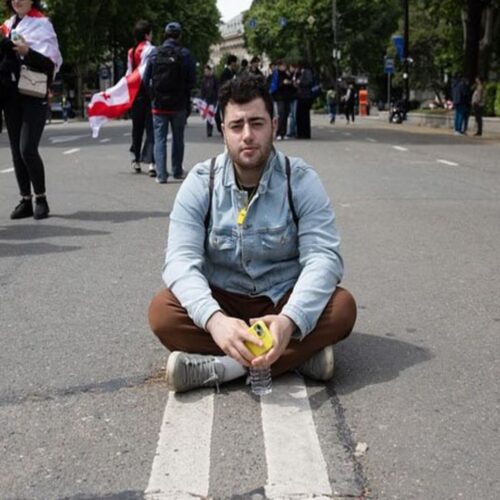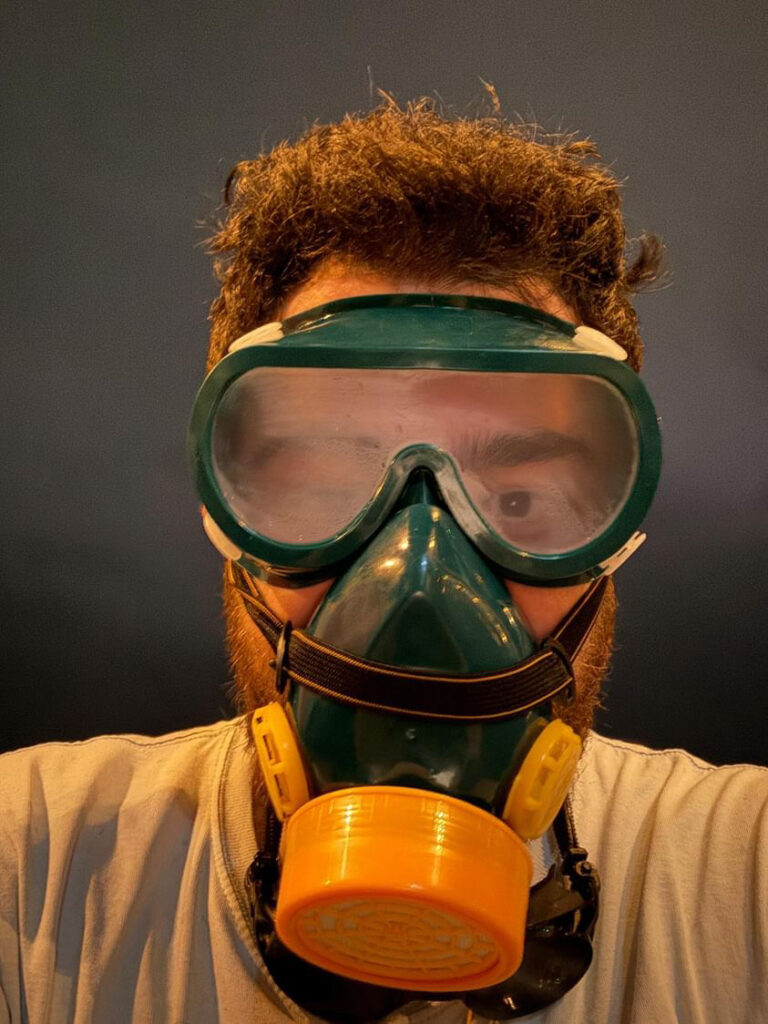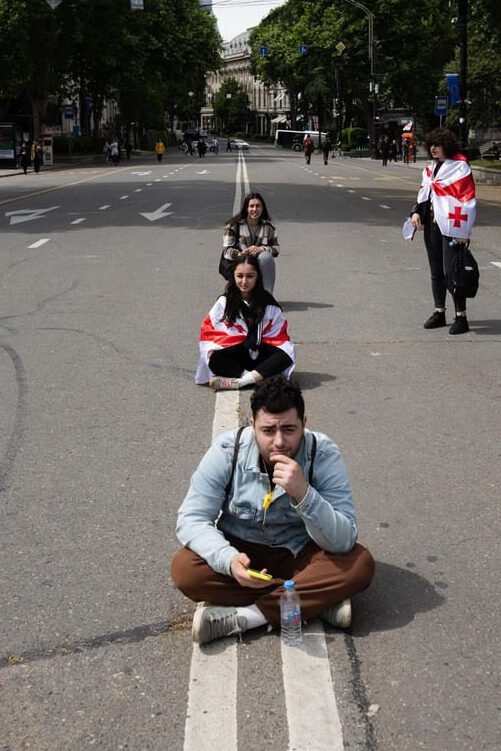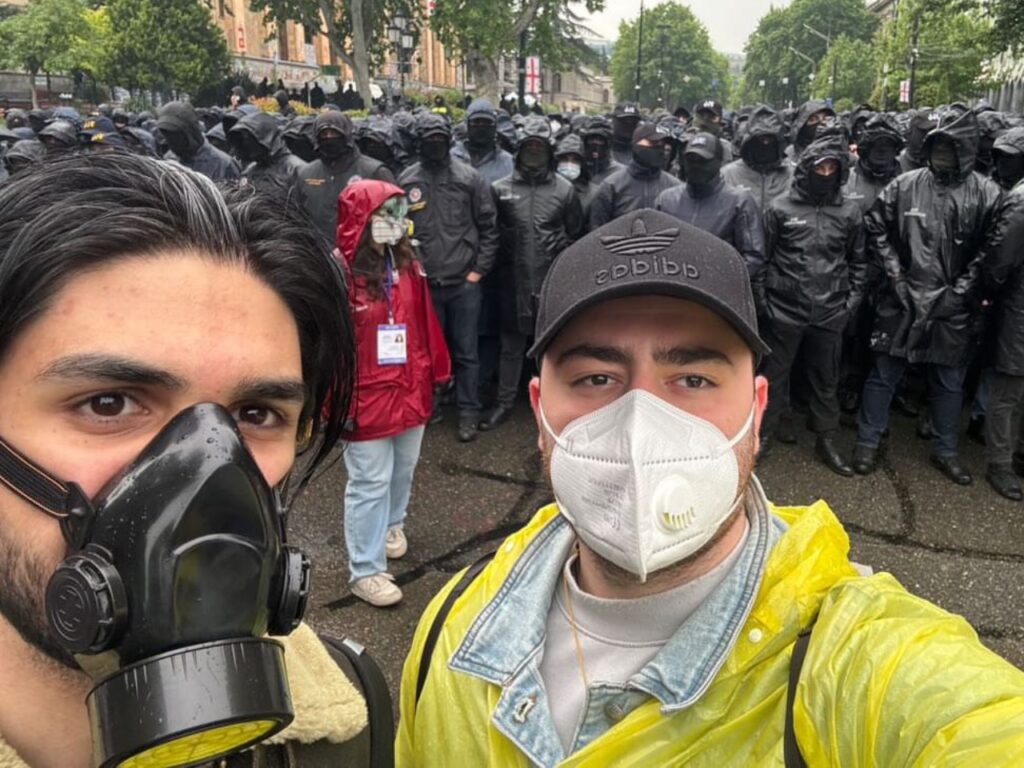Hundreds of Georgian students join protests against ‘Foreign Agents’ Bill amid police crackdown
Within seconds, an enormous cloud of smoke enveloped us. I instinctively guided those around me, urging them to move without panic… The gas cloud blinded me, choked my breath, and impaired my senses.
- 2 years ago
July 8, 2024

TBILISI, Georgia — When the government announced the Foreign Agents’ Bill in Georgia, my friends, fellow students, and I joined demonstrations. We sought to convey to Europe and the world, we are Georgians; our future lies with the European Union. We organized a peaceful demonstration on Rustaveli Avenue in Tbilisi where 200,000 individuals gathered to voice the will of the people.
Despite our numbers and passionate cries for freedom, we quickly felt the oppressive force of the government. They deployed riot police and special forces to silence us. Standing before us, they were unbeatable. Using water cannons, tear gas, and random arrests, they suppressed our peaceful expression. The unjust use of power against peaceful demonstrators created an imbalance, leaving us powerless, angry, and frustrated.
Read more conflict stories at Orato World Media.
Protesters in Tbilisi devise strategies to resist and escape police oppression
Rustaveli Avenue sits at the heart of the city of Tbilisi. It spans over a kilometer, featuring cafes, galleries, museums, and governmental buildings. It leads to Liberty Square, which connects to the nearby Peace Bridge. With the demonstrations hosted there, I felt compelled to join. The location resonated deeply with the ideals of liberty and peace.
On the first day of the protest, my friends and I raised our voices – a generation collectively united. We showed up unprepared but determined, aiming to be the heart of the movement and leading by example. We asserted that this legislation dangerously aligns Georgia with Russia—an unacceptable stance for a free and democratic country.
The demonstrators also recognize the crucial role of sponsorship by Europe and the United States in developing our country. The Foreign Agents’ Bill contradicts our very nation. It undermines our progress and jeopardizes our aspirations to join the European Union in the future.
At the protest, we lacked proper supplies and clothing, facing a long day of standing that took its toll on our bodies. As the crowds gathered on the avenue, we occupied the road, shouting “freedom” and “slave” whenever we witnessed aggressive actions by the police force.
Recognizing the strain on our voices, we devised a starter pack containing whistles. These whistles served as our voice when words failed, expressing our unwavering will and defiance against intimidation. We also wore KN-95 medical masks to protect our ability to breathe. This was essential because the police used gas against the protesters. Maintaining clear vision was crucial, so we carried glasses to counteract the gas’s effects. We discovered that walking fast, rather than running, proved the best strategy to escape the gas, as running consumed more oxygen.
Police tactics escalates and protesters seek emergency aid
As the days progressed, demonstrators moved to different landmarks along Rustaveli Avenue. They stopped by theaters, the Parliament building, and even made it to Liberty Square. We aimed to capture the world’s attention and broadcast our opposition to this unjust law. Simultaneously, the police intensified their aggression.
My friends and I stood together, demonstrating peacefully, when a tense moment erupted. A policeman attempted to forcibly arrest one of us. I felt the frustration surge within me. Then, suddenly, the police fired a gas shell that landed directly in front of me. It was evening by then and darkness settled on Tbilisi. I trembled as I watched the shell release gas. In that moment, I recognized the limitations of individual efforts and that true change requires collective action.


Within seconds, an enormous cloud of smoke enveloped us. I instinctively guided those around me, urging them to move without panic. I felt that calm leadership mattered in the midst of chaos. The gas cloud blinded me, choked my breath, and impaired my senses. Desperate, I followed a faint light at the end of Rustaveli Avenue, which turned out to be an emergency vehicle.
There, I found my friend, Luca, who provided relief by giving me milk for my eyes, soothing the effects of the toxic gas. Much like after a spicy meal, the milk felt like a welcome balm to my burning vision. It took several minutes to compose myself. When my vision returned and my lungs cleared, I rejoined the demonstration. The people displayed an unbreakable power of will, and I aimed to demonstrate the same strength they did. No one paid us to be there. We consider the demonstrations a compelling necessity in order to stop this law from affecting Georgia’s future.
Georgians’ struggles for the possibility of EU integration
For weeks, we have demonstrated on the streets of Tbilisi. President Salome Zourabichvili wielded her presidential power to veto the foreign influence law. Unfortunately, our hope for reversing the law was dashed when Parliament overruled the veto.
While the president supported the people of Georgia, her influence revealed limitations. Ultimately, Parliament holds the power, and they lean toward closer alignment with Russia. I already knew Parliament would proceed with the law, and it deeply saddens me.
In my view, persistence remains the key to progress. We must not cease our demonstrations. The government needs to understand that we will not back down. We demand to be part of the European Union.
Both older generations and the youth must speak up because together, we symbolize unity and strength. I will continue to stand with the masses, demonstrating our desire for a future aligned with the EU, not with Russia.



































































































































































































































































































































































































































































